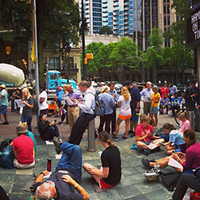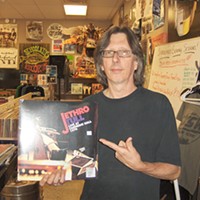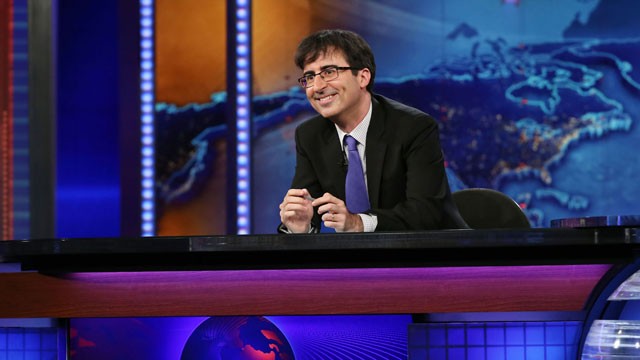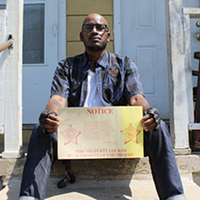Brit wit John Oliver offers satiric spin on U.S. politics
A golden age of satirists are taking on government, cable news and cultural idiocy.
By John SchachtNow that North Carolinians have the legal right to pack heat in bars — the one venue where rational discourse always prevails, right? — it's a good time to revisit the role satire plays in American life. Few issues stir the hornet's nest at satirical TV news shows such as The Daily Show with Jon Stewart, for instance, as the government pantomimes that follow our all-too-frequent mass shootings.
Take last April, when another watered-down gun control bill was killed in the U.S. Senate by career pols who fear the National Rifle Association more than the 90 percent of Americans who support stricter background checks. While the foregone conclusion played out, the fake newscast that's been lampooning political hypocrisy with Emmy-hoarding success for the last 15 years sent "Senior British Correspondent" John Oliver to Australia for a close-up look at its strict gun control laws.
There, after a lone psychopath gunned down 35 people in 1996, Australia's conservative government sacked up and passed far-reaching gun control legislation, despite considerable pushback from the party's base. It was a stark contrast to Capitol Hill's spineless response, which Oliver mercilessly savaged.
"It was the single most pathetic piece of legislation that I've ever seen, and I've seen some pretty dispiriting moments of democracy in action," says the 36-year-old Oliver via phone from The Daily Show's New York office. Oliver, who brings his politically charged stand-up act to Knight Theater on Nov. 23, shared a writing Emmy for the three-part Daily Show series that followed. After talking to numerous Australian officials who confirmed that gun-control legislation had worked and taken less than three-and-a-half months to enact, the mock-baffled correspondent fell into a surreal hallucination, complete with pistol-packing kangaroos, a Charlton Heston "pry it from my cold, dead hands" voiceover, and Men At Work music.
All the fun stuff was framed by Oliver's debate with Philip Van Cleave, a facts-be-damned Second Amendment supporter and NRA mouthpiece from Virginia. Confronted with the Australian evidence — no mass shootings since '96, lower murder and suicide rates — and the wormholes of his own illogic, Van Cleave nevertheless stuck gamely to his, well, guns. At the end of the bit, Oliver turned the NRA party line neatly on its head.
Oliver: If guns aren't the problem, Philip, what is the problem?
Van Cleave: People.
Oliver: People are the problem?
Van Cleave: Yes.
Oliver: (Long comedic pause) After spending this amount of time with you, Philip, you know what? I'm starting to believe that that's partially true.
Ideologues like Van Cleave are grist in The Daily Show's comic mill, and have been satirists' fodder since Aristophanes' ancient Greek diatribes. But today, professional debate-framers and the righteously ill-informed find plenty of air time on supposedly credible "news" outlets, dragging legitimate journalism and public discourse on issues such as gun control, healthcare, civil rights and the economy into the crapper with them.
The silver lining? These political party flunkies and news-manipulating demagogues have ushered us into a golden age of satire, led by The Daily Show and its spin-off, The Colbert Report. Having been raised in one failed empire, and now witnessing another crumble, Oliver brings a uniquely qualified angle to a satirical realm that is seen increasingly as a corrective to, and not just commentary on, the daily news-as-entertainment cycle.
"There was a lot going on that was incredibly depressing, but inherently quite comic — albeit blackly comic," says Oliver of the gun debate. "And that's kind of the sweet spot of where our show lives."
OLIVER's STATURE at The Daily Show, and in American culture in general, took a great leap forward this summer when regular host Jon Stewart asked him to fill in while he directed his first feature film, Rosewater. "I said, 'Yes,' just because I generally say 'yes' to anything he asks me to do," Oliver jokes. "It was only on putting the phone down that I thought, 'Holy shit, what have I just agreed to?'"
Of his inaugural night as host, Oliver describes the first pan of the camera to him after the music introduction as "nine seconds of sheer panic." But he says, otherwise, the two months went by in a blur. He received the comedic gifts of Anthony Weiner's dick pics and San Diego Mayor Bob Filner's groping campaign, and even joked about breaking The Daily Show when a power outage hit the studio. Oliver handled himself well enough that there was talk of him taking over the show eventually.
Instead, Oliver announced recently that he's leaving The Daily Show for his own talk show on HBO, set for Sundays in 2014. That should increase his profile, which already includes a recurring role on the NBC sitcom Community and his regular Comedy Central showcase, John Oliver's New York Stand-Up Show.
It was fellow Brit comic Ricky Gervais who first recommended Oliver to Stewart, though he only knew him by his growing reputation in Britain. That was in 2006, and the fit has turned out to be a natural. Oliver has all the requisite correspondent requirements — quick wit, great timing and an inoculation against public shame — to do the job in front of the camera as well as back in the writer's room.
"I'm pretty stupid when it comes to making adult-informed, non-risk choices," he says. "I'll do anything as long as the story seems interesting enough that we can do something fresh enough with it."
Thanks to America's cultural hegemony, Oliver had a running start in the nuances of American politics and culture. But being a foreigner allows him the distance and curiosity that an outsider enjoys. It helps that the "Senior British Correspondent" looks the part: His skin is scone-colored, his beak is Pete Townsend-sized, and his irregular choppers only play up the stereotypes about British dental care. His accent is a mishmash of regional dialects and his body language an amalgam of nervous tics, linking him to other memorable British comedians.
Britain's daily newspaper The Guardian cited those characteristics as probable reasons for his instant acceptance in the States: "His style leans toward the kind that Americans like best from the British — exaggerated, full of odd accents and mannerisms, in the vein of Monty Python."
Oliver has also raised the bar on swearing at The Daily Show, practically turning it into an art form informed by the British facility with our language. ("We had the words first," he half-joked one time with a reporter while arguing over the pronunciation of "aluminum.") Of the recent GOP-led government shutdown, Oliver said it was "at best, petulant, and at worst, an act of breathtaking, but depressingly precedented, fuckwittery."
We'd bristle at such ribbing had it come from the mouth of an upper-crust scold looking down his nose at us. But Oliver's fondness for America comes through in his comedy — until 2009, when he got his green card, Oliver even risked deportation if he got arrested. That nearly happened at the 2008 Republican Convention, when The Daily Show correspondents had no official press passes and snuck into the convention using what subterfuge they could. It was while being chased by security that protesting Iraq War veterans hid the correspondent. In a nice twist, Oliver wound up marrying one of them, an army medic.
Some might say Oliver was born to the job of satirist. Satire at the level practiced by Stewart and Stephen Colbert is the equal of any, he says, but being British comes with an inherent disrespect for authority borne of "hundreds and hundreds and hundreds of years of being let down by authority figures." Cynicism and sarcasm nurture Brits from the cradle on, spurred by the living anachronism of The Royal Family and the attendant class system. Both supply rich veins of comic material, as one class enjoys the unearned perks of aristocracy and the other hates their guts for it.
The surrealist font for most modern British satire was the 1960 stage show Beyond the Fringe, featuring one of Oliver's comedic heroes, Peter Cook. The show's skits played ruthlessly off class differences and political ineptitude. It's been inspiring British comedy ever since, including recent fare like the scalding political satire The Thick of It — written by another Oliver influence, the Scottish satirist Armando Iannucci.
"The class system is a painful thing; it becomes part of your DNA and it's also inherently ridiculous, so it's a fun thing to fight against," Oliver says. The comedian has a pedigree similar to some of his heroes and influences, having studied English at Christ's College, Cambridge, and performed with the school's student-run comedy troupe and satirist factory, the Cambridge Footlights. Before breaking through in the U.S., Oliver and fellow British comic Andy Zaltzman co-hosted Political Animal, a BBC 4 radio show, which has now morphed into The Bugle, a weekly podcast savaging the politics of the day since 2007.
But the real key to Oliver's comedy is that he gets America — even if he pretends not to get North Carolina, which he ribbed mercilessly during The Daily Show's DNC coverage and hammered this summer for its "true shit-berg of a legislative session." Maybe it was the Richard Pryor LPs he listened to when falling asleep as a youngster, or maybe it's because he sees the U.S. headed down a familiar end-of-empire path.
"You are absolutely, justifiably, sowing the seeds of disrespect for centuries with the sheer circus of incompetence which is taking place under our feet at the moment," Oliver says, before slipping into his mock commentator voice. "Oh, it's coming, America, it's coming!"
IN 2008, a poll released by the Pew Research Center found that 21 percent of people aged 18 to 29 cited The Daily Show as a place where they regularly learned presidential campaign news. Since then, it's become de rigueur for the media to repeat that as a general truth. (In a massive PRC poll last year, Trends in News Consumption: 1991-2012 report, there was The Daily Show and The Colbert Report right next to The New York Times and CNN, cited in sections with titles like "Profiles of Regular News Audiences.")
Oliver discourages this kind of thinking, paraphrasing Cook's famous comment about all the cabaret satirists in Germany who "did so much to stop the rise of Hitler." During an interview at 2011's SXSW, Oliver said, "I have no influence as a comedian; people do not watch The Daily Show for news. I realize that that is something people love to say, but that cannot be true. If it is true, this country is in real trouble. But it's not true. You have to watch the news, you have to imbibe the news, to be able to understand what we're talking about."
If there's a tendency to see The Daily Show as a news source, it's in part because of its focus on the shortcomings of cable and network news programs, regular targets of the show and Oliver's stand-up. To Oliver and Stewart, cable news networks in particular have abdicated their role as context-providers and bullshit detectors in favor of shiny digital gadgets and pundit shouting matches — or in the case of Fox News, simply becoming an echo chamber for its owner's demagoguery. A good portion of political satirists' jobs these days seems to be fact-checking news outlets to correct the record.
With that backdrop, the Pew researchers declared that The Daily Show "performs a function that is close to journalistic in nature — getting people to think critically about the public square."
That thought is echoed by Daniel Grano, assistant professor at UNC-Charlotte who teaches communication ethics and cultural studies. "The most troubling events are often supported by logics (racism, sexism, homophobia, greed) that mainstream news won't touch because they're so concerned with superficial notions of bias — so, for example, we get false equivalency or supposedly open questions about whether racism is still a problem in America," he says. "Comedy starts with the assumption that there is, in fact, something deeply corrupted behind our troubles and doesn't shy away from critique."
This summer, Oliver learned the extent of the role that The Daily Show plays in people's lives the day after the George Zimmerman/Trayvon Martin verdict. He calls it the most difficult day of his tenure in the host's chair, and felt Stewart's absence more keenly that day than any other.
"It's not a cathartic thing to perform — you're kind of regurgitating poison," he says. "But that's probably the clearest example where you're performing [satire] to give people some kind of release. It's not that funny — what you're having to do is channel frustration, disbelief and anger into laughter. That is not an easy kind of alchemy to pull off."
It feels, however, like an increasingly essential one. Satirists like Oliver may not bring us the news, nor are they keeping reactionaries from trying to turn the clock back to some mythic 1950s Leave It to Beaver America. They just keep us laughing rather than crying about it.
Speaking of...
-

'Hamilton' Arrives This Week, Lifting Local Artists or Eclipsing Them?
Oct 10, 2018 -

You Can Do Whatever You Want to Do
Feb 28, 2018 -

Best of The Blotter 2017
Dec 20, 2017 - More »
Latest in Cover story
More by John Schacht
-

Two Ex-'CL' Music Editors Put the Charlotte Scene Into Perspective
Apr 26, 2017 -

CD Review: Floating Action's Body Questions
Nov 12, 2014 -

CD review: Buellton's Silent Partner
Oct 1, 2014 - More »
Calendar
-

NEW WINDOW GALLERY-Pat Rhea-ACRYLIC PAINTINGS-April 05-30 2024 VALDESE, NC 28690 @ New Window Gallery/Play It Again Records
- Through April 30, 12 p.m.
-
Derek Hough - Symphony Of Dance @ Ovens Auditorium
-

"Blood Residue Analysis of Paleoamerican Stone Tools in the Carolinas" @ Native American Studies Center
- Fri., April 26, 12-1 p.m.
-

ARTS RENAISSANCE, a GALA supporting the ARTS in South Carolina @ the Columbia Museum of ART
-
 The Piano Guys @ Ovens Auditorium
The Piano Guys @ Ovens Auditorium
-
Charlotte ink 7
Behind the pain with a trio of the Queen City's finest tattoo artists
-
The death of CAST 5
What really happened to Charlotte's beloved experimental theater company?
-
Jessica Moss Makes the Gantt Center a Safe Zone for Local Artists 2
Flipping the script










